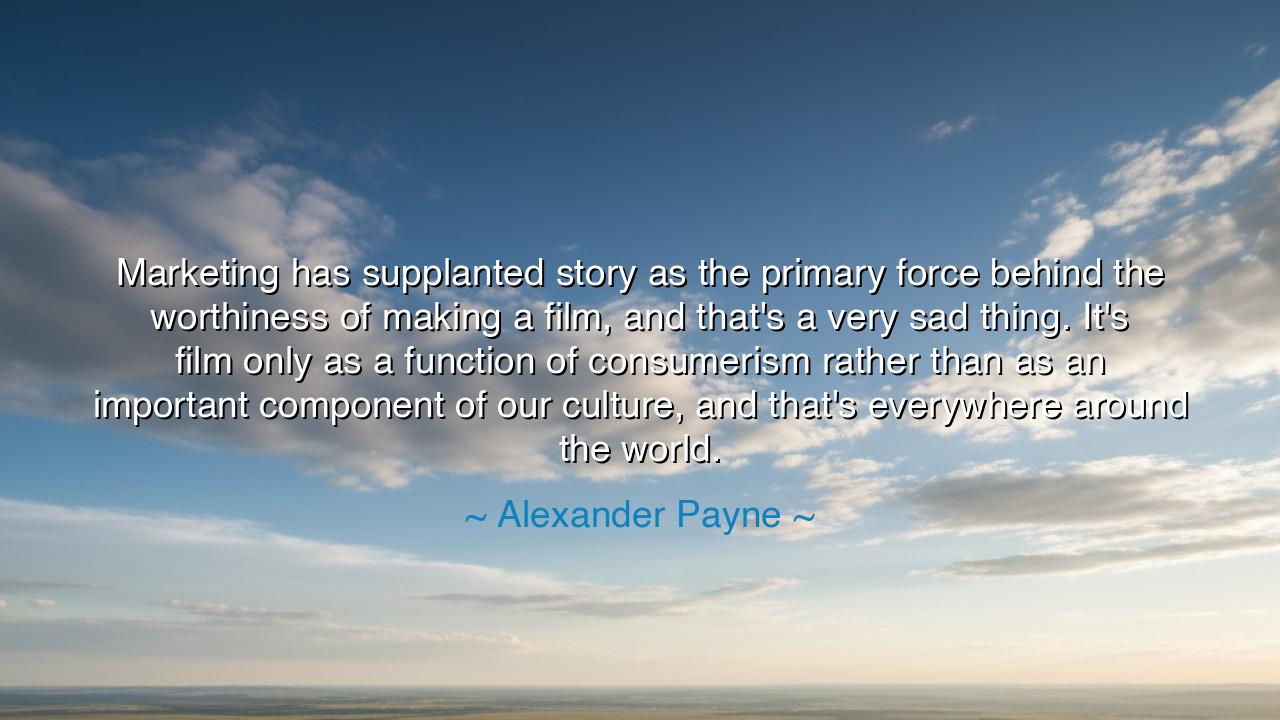
Marketing has supplanted story as the primary force behind the
Marketing has supplanted story as the primary force behind the worthiness of making a film, and that's a very sad thing. It's film only as a function of consumerism rather than as an important component of our culture, and that's everywhere around the world.






Alexander Payne once spoke with the tone of an elder craftsman watching his sacred art slip into the hands of merchants: “Marketing has supplanted story as the primary force behind the worthiness of making a film, and that's a very sad thing. It's film only as a function of consumerism rather than as an important component of our culture, and that's everywhere around the world.” In this lament, he names not only a crisis in cinema, but a crisis of spirit—the triumph of commerce over creation, of profit over purpose. His sadness is not rooted in nostalgia, but in the recognition that when art becomes an instrument of salesmanship, it ceases to serve the soul and begins to serve the market.
The ancients, too, understood this danger. In Greece, art was born as a service to truth, a reflection of divine order. Tragedy was not entertainment; it was education for the heart. Painters, poets, and sculptors sought beauty not for gold, but for meaning. Yet, as wealth flooded Athens, art began to flatter rather than challenge. Statues of gods became ornaments for the rich, plays became vehicles for political favor. So it is in our time, Payne warns: the modern temple of cinema—once built for storytelling—now bends its knee to marketing. Films are greenlit not for the truths they reveal, but for the tickets they sell.
When Payne says the “bar has been set low” in this age of marketing-driven cinema, he speaks of a silent corrosion. The filmmaker’s first question is no longer, “What story must be told?” but “What will sell?” The story, once the beating heart of the art, has been reduced to a skeleton to hang advertisements upon. The purpose of film—once to illuminate the human condition—has become to feed the machinery of consumerism. The hero’s journey has been replaced by the franchise. Where myth once gave meaning, now marketing gives metrics.
Consider the story of Federico Fellini, who in the 1960s defied producers demanding spectacle and easy profit. He risked failure to create 8½, a meditation on creative paralysis itself—a film that spoke not to the market, but to the human soul. It was not designed to sell toys or sequels; it was designed to make us think, to feel, to awaken. Such courage is what Payne grieves the loss of—a time when cinema was a dialogue between artist and audience, not a transaction between producer and consumer. The marketing age has blurred this sacred bond, replacing communion with consumption.
Yet Payne’s lament, though sorrowful, is also a call to arms for all creators. He reminds us that culture survives only through the stubbornness of its storytellers—those who refuse to bow before algorithms, those who still believe that a film’s worth lies in its heart, not its box office. The artist’s duty, ancient and eternal, is to hold up a mirror to humanity, to reflect its darkness and its grace, not merely to distract it from the void. Every generation faces the temptation to trade truth for popularity. The wise resist.
There is also a universal warning hidden in Payne’s words: that when any civilization begins to treat its art as product, its spirit begins to atrophy. For art is not luxury—it is memory, conscience, and imagination woven into form. When stories vanish, people forget who they are. The culture that consumes without reflection becomes hollow, and soon, it no longer creates but only copies. History offers grim examples: the fall of Rome, when artistry gave way to spectacle; the decline of the Renaissance, when painters became servants of noble vanity. Payne sees this same pattern repeating—not in marble or fresco, but in pixels and premieres.
Thus, let his teaching be carried forward: guard the story. Whether in film, literature, music, or life, let the story—not profit—be the compass. Demand sincerity over spectacle, substance over sales. Support the creators who dare to speak truth rather than trend. And if you yourself are a maker, resist the easy lure of applause. Tell the story that burns within you, even if it earns you nothing but peace. For in the end, as Payne reminds us, culture does not die in silence—it dies in noise. And when the voice of marketing fades, it is the storyteller, humble and steadfast, who will once again teach humanity how to listen.






AAdministratorAdministrator
Welcome, honored guests. Please leave a comment, we will respond soon